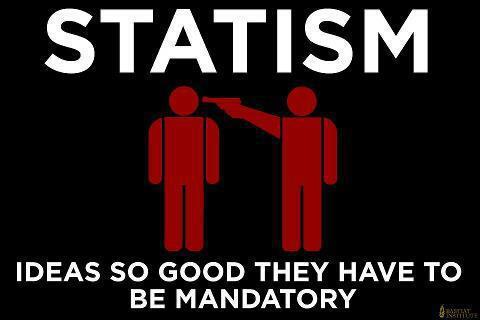The default assumption for most people is that one should not initiate force (violence) against others without good reason. This has been dubbed the “non-aggression presumption” (NAp) by philosopher Michael Huemer. The point is that, while there may be exceptions to the general rule, the onus is on those who want to initiate force to justify that act. Notice that self-defense is not an exception, since it is not initiation of force, but retaliatory (or rectificatory) force in response to the initiation of force. Similarly, recovery of stolen goods by force is retaliatory force, so does not violate our non-aggression presumption. The NAp is a good place to start a discussion of freedom of association, since virtually everyone already agrees with it, and those who do not are a small set of psychopaths the rest of us are willing to ignore for the purpose of moral guidance.

Freedom of association is the right to associate with other consenting people, or not associate. Thus there is a positive and negative side to this right. The positive part is that no one should be forcibly prevented from associating with consenting others. The negative part is that no one should be forced to associate with another person. This is analogous to other rights such as freedom of speech. The positive part of freedom of speech is that no one should be prevented from engaging in speech; the negative part is that no one should be forced to speak. The prohibition of government forcing people to self-incriminate, or of torture to force confessions, are examples of the negative aspect of free speech.
Freedom of association was broadly supported for most of the first two centuries of United States history, except for a short period after the failed War for Southern Independence. Yet nowadays it not only has little support, but is misunderstood or unknown to many Americans. For example, most “liberals” mistake freedom of association for freedom of assembly or the freedom to join unions or political parties. The negative aspect - the right not to be forced to join or associate - is forgotten or explicitly denied by them. How did this shift of opinion come about?
The answer is: Freedom of association was killed primarily by two closely related assassins - the interstate commerce clause of the US Constitution and the consolidation of power by the central government over the states. This reflected the change in people’s attitudes toward freedom and governance. Over two centuries, Americans went from seeing the central government in Washington DC as a protector of rights to a righter of social wrongs. Whereas earlier generations of Americans saw civil society as capable of evolving and correcting non-violent but wrongful actions, later generations saw society as a product of the central government and its decrees, and deemed voluntary social action incapable of addressing certain social issues. The attitude went from the libertarian “stop criminal aggression and otherwise let the people be” to “use the power of decreed law to mold the people into better citizens.”
Jefferson’s self-evident truths, the rights of “life, liberty, and the pursuit of happiness” for all men, was the prevailing opinion when those words were written. Of course, some people were not included in “men,” such as women and black people, but the expansion of these rights to all people is a different subject discussed extensively elsewhere. The point is that, for those deemed full-fledged moral agents, freedom of association was recognized by most, even (or especially) those who were not deemed fully human yet.
The occupation of the rebel states after their failed War for Southern Independence changed things. Since all but Northerners were expelled from Congress, and a revengeful war punishment fever prevailed among the ruling elites in Washington, the extremist Civil Rights Act of 1875 was passed. For the first time, formal violation of freedom of association was decreed, in the area now known as the “public accommodations” exception.
Civil Rights Acts have been formulated as a package deal. Historically, they have combined two different types of discrimination.
- Inequality under the Law aka government discrimination:
Official government discrimination on the basis of race, sex, or some other factor. - Inequality of Individual Treatment aka private discrimination:
Discrimination by private individuals or businesses acting in a non-government capacity.
The first type of discrimination - governmental discrimination - is considered wrong by virtually everyone, and is uncontroversial. The second type, however, is problematic since it violates freedom of association. Using our free speech analogy, the first type would be as if the government passed a law preventing government employees or Senators from giving racist, anti-Christian, or pro-secession speeches, while the second type would be the government outlawing private individuals from giving such speeches. Even if you approve of making the law apply to the internal operations of government and application of its laws, it is a gross violation of individual rights to apply it to people as individuals. Needless to say (except for those who fall for the ACLU fallacy) support for these individual rights is not support for the particular ideas espoused.
Many of the ruling politicians of the reconstruction (sic occupation) period realized that the Civil Rights Act of 1875, along with the 13th and 14th amendments, violated the right of freedom of association, by including the second type of discrimination in the decrees. According to historian John Hope Franklin, president Grant never tried to enforce it, and did not even send copies of it to US attorneys. The succeeding president Hays also ignored it. Public opinion was opposed to it, and the press was overwhelmingly against it. The Civil Rights Act of 1875 was declared unconstitutional in 1883 by the Supreme Court in an 8-1 decision. The Court ruled that while the US has the power to prohibit discrimination by the government (type one), it does not have the power to prohibit discrimination by private individuals and organizations.
Proponents of the Act attempted to justify this new governmental power by citing the Equal Protection Clause of the Fourteenth Amendment. That, however, is about “equal protection of the laws” and only applies to governmental actions, not the actions of private individuals and groups.
However, that was not the end of it. As Jefferson noted, “The natural tendency of things is for government to gain ground and for liberty to yield.” A century later, the central government had grown considerably in power, aided by two world wars and the snake-oil of patriotic imperialism. A new doctrine arose among the ruling elite - that the commerce clause in the US Constitution justifies massive previously unknown government powers, including the power to violate freedom of association. The sheeple who had followed their rulers into European wars were by then habituated to servitude, and generally did not object to this violation of rights. The shallow emotionalism of feel-good politics had overcome any devotion to the rights of man for most Americans. “Racism is mean, so the State should outlaw it,” became the general attitude of the democratic masses. Individual rights, and freedom of association in particular, was off the radar of most Americans. Freedom of speech was similarly incapacitated, with various ad hoc exceptions related to commercial speech and “hate speech” being legally sanctioned. The old Animal Farm joke had come true. Everyone has free speech, except for commercial or hateful speech as determined by the rulers. Everyone has freedom of association, except it is prohibited to exercise it in the negative sense of not joining or not associating. Government imposed segregation was replaced by mandatory integration, liberty be damned.

The official execution by guillotine of freedom of association occurred with the passage of the Civil Rights Act of 1964. The rationalization for the execution was the interstate Commerce Clause, which had expanded from its original meaning of maintaining a free trade zone among the states, i.e. preventing tariffs between states, to a draconian law that allowed the central government to control anything that could remotely affect interstate commerce. (Infamous cases include forbidding a farmer from building a retention pond, to a grandmother forbidden to grow her own pot. Those acts affect interstate commerce, according to rulers, since prices may be affected if too many people did these things.) With a blade like the Commerce Clause, freedom of association was doomed to the guillotine.
Is there any hope to recover this freedom? Probably not, until states start seceding from the US. Only devolution to smaller, freer political entities can give localities a new starting place for creating a more libertarian society. Democracy does not scale up without destroying liberty. In a large winner-take-all democracy, the loss of liberty and growth of government violence-power is inevitable, as Jefferson warned. The US is fast approaching its demise due to the intransigent tribalism nourished by winner-take-all democracy. Furthermore, the rulers stay in power by continually debasing the US dollar, and the fiat dollar will hyperinflate soon. Be ready for a US breakup similar to the one that happened in the USSR in 1991. Enjoy the new found freedom in the resulting local governments. Hopefully, you and your neighbors will start fresh with all your freedoms intact.
It is to secure our rights that we resort to government at all. - Thomas Jefferson
